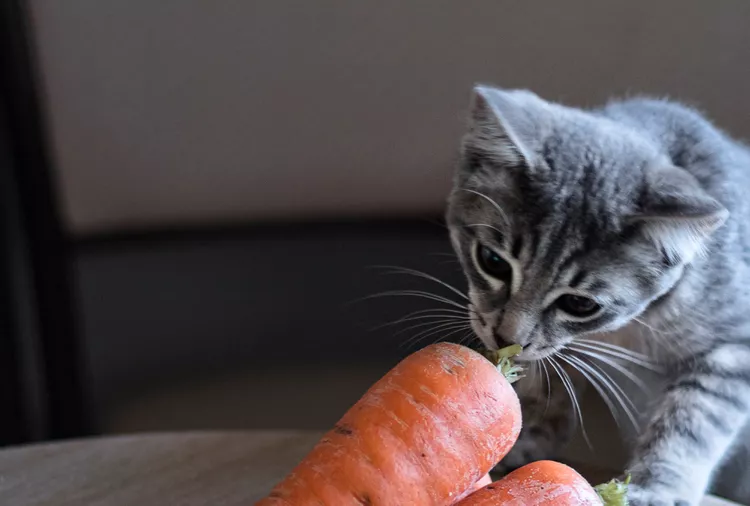Can Cats Eat Carrots? How to Safely Feed This Vegetable To Your Feline

Pet parents looking to give their cats the occasional veggie treat may wonder if cats can eat carrots. While carrots are a safe option for your feline family member, you’ll want to know the potential risks and benefits before giving this vegetable to your cat.
Learn more about how to safely share carrots with your cat.
Can Cats Eat Carrots?
Yes, cats can eat carrots. Carrots are a safe vegetable for cats to snack on and are not considered toxic to cats, but they should only be given as occasional treats.
Cats are obligate carnivores, which means they require animal products in their diet to meet their nutritional needs. Additionally, if your cat is eating a diet approved by the Association of American Feed Control Officials (AAFCO) for their life stage, all their nutritional needs are being met by their normal cat food. Your cat’s balanced diet should make up at least 90% of their daily calories. Any treats, including carrots, should not comprise more than 10% of your cat’s daily caloric intake.
Nutritional Value of Carrots for Cats
Carrots are a good source of fiber, which can help with your cat’s digestion. Fiber improves stool quality in cats.
Cats are also a great source of the following vitamins and minerals:
- Vitamin C
- Vitamin K
- Vitamin B6
- Iron
- Calcium
- Potassium
- Zinc
Carrots also contain the antioxidant beta carotene, which can be helpful with cognitive function, as well as skin and eye health.
How to Prepare Carrots for Cats
If you’ll be feeding carrots to your cat, make sure you’re cooking and slicing them correctly to make them more digestible and to reduce the risk of choking.
Here's how to properly prepare carrots for your cat:
- Prep: When preparing carrots for your cat, make sure that you wash and peel them first! This will remove any dirt and pesticides.
- Cook: You can boil, bake, or steam them to make them softer for your cat to chew. Cooking the carrots can also help make them more digestible. Do not add spices, seasonings, or oils to the carrots. Some seasonings, such as garlic or onion powder, are extremely dangerous for cats.
- Serve: When feeding carrots to your cat, it's best to slice them into small pieces so your cat can more easily chew and digest them.
Potential Risks and Considerations
Feeding too many carrots can impact the balance of your cat’s diet, so they should only be given as an occasional treat.
Other risks include:
If your cat already has any chronic health conditions, such as diabetes, you should speak with your veterinarian before adding a new food to your cat’s diet.
Other Cat-Safe Veggies
Not all cats will like carrots, and that’s okay. If your cat turns up their nose at carrots, and you still want to find a vegetable snack for them to enjoy, consider one of these alternatives:
- Celery
- Zucchini
- Broccoli
- Peas
- Spinach
- Green bell peppers
- Green beans